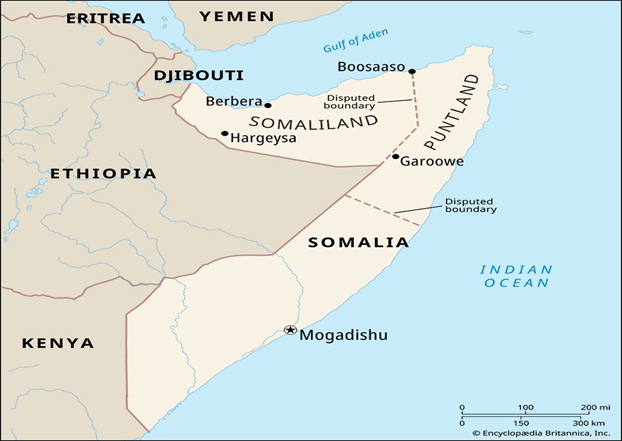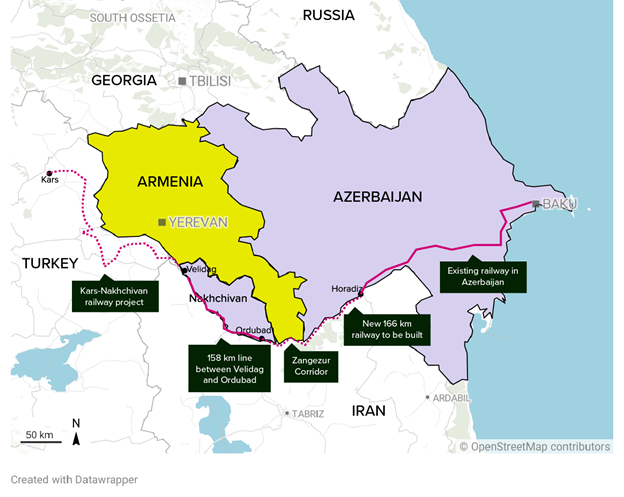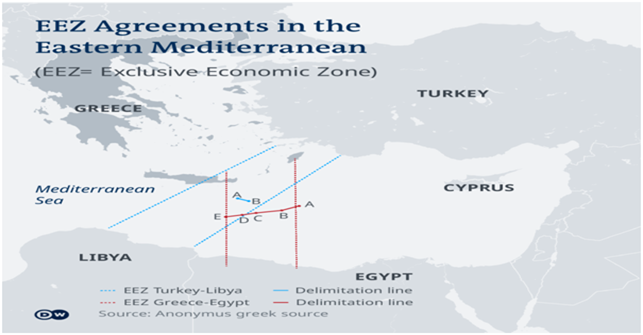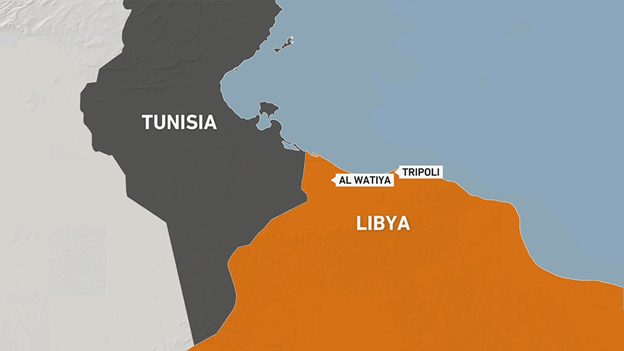
Indian Council of World Affairs
Sapru House, New DelhiTurkiye as a Disruptor: Its Role in Different Zones of Geopolitical Tensions
In recent times, Turkiye’s foreign policy has leveraged the country’s multiple identities, such as its Islamic, Turkish and Ottoman Era legacy, as well as its geo-strategic location, to expand its ideological, civilizational and geopolitical ambitions worldwide. The central element of Turkiye’s foreign policy is the resolution called the ‘Century of Turkiye’[i] that aims to achieve “peace at home, peace in the world”. While it prioritises regional peace and security through combating terrorism and extremism, conflict resolution, mediation and regional ownership,[ii] on the contrary, in recent years, Ankara’s foreign policy behaviour and actions have not been in line with its objectives as evidenced from its position related to its territorial claims in the eastern Mediterranean Sea, military interventions in Libya, Syria, the Horn of Africa and the South Caucasus, and its rhetorical stance on Gaza War and increased outreach in the Indo-Pacific region based on religious affinity. Turkiye’s approach on Libya and Syria has come into direct conflict with regional players such as Saudi Arabia, Egypt, and the UAE. In the Indo-Pacific region, it is disturbing the traditional partnership with small littoral states, particularly with the Maldives. In the Horn of Africa, the involvement of Turkiye in the ongoing conflict between Somalia-Somaliland and Ethiopia has reduced the prospects of negotiations and intensified the threat of regional conflict. In the South Caucasus region, the conflict between Armenia and Azerbaijan has been capitalised by Ankara to unite the ‘Turkic World’ to meet its geopolitical and economic interests. President Erdogan used the Gaza War to increase his political legitimacy.
Since his re-election as President of Turkiye in May 2023, Recep Tayyip Erdogan has set the agenda to elevate Turkiye’s international status, establishing it as a representative of the broader Muslim world, as it used to be during the rule of the Ottoman Empire. The paper aims to examine the role of Turkiye in these zones of geopolitical tension.
Turkiye’s Role in Geo-political Conflicts
Somalia-Somaliland Conflict: From ‘Balancer’ to ‘Aggravator’
In the past couple of years, Turkey’s military and economic ties with Somalia have grown significantly. In 2017, Ankara established a crucial military training centre and a strategic military base, Camp TURKSOM, in Mogadishu. These installations have become the backbone of Somalia’s defence capacity, playing a pivotal role in the country’s fight against separatist and terrorist groups.[iii]Turkiye signed a deal with Somalia to rebuild and control the Mogadishu port in 2020, which replaced the UAE that previously managed the port. Pro-Turkish government mouthpiece TRT World alleged that the Somalian government’s backlash came after the UAE signed two separate deals with the Somalian autonomous region—Puntland in 2017 and Somaliland in 2018—to build ports that Somalia considered its territories.[iv]

The growing presence of Turkiye has increased the security concerns of both Somaliland[v]and Ethiopia. Ethiopia is a land-locked country, and access to Sea is an important issue, which Somalia blocked as it gained military support from Turkiye.[vi]Therefore, on January 1, 2024, Ethiopia signed a port[vii]deal with Somaliland to get access to the Gulf of Aden. Under this deal, Ethiopia was allowed to build a naval facility in return for its recognition of Somaliland’s statehood, which has not been recognised by any other country.
The deal had angered Somalia, and to deter Ethiopian access to the Gulf of Aden, on February 8, 2024, Somalia signed a Framework Agreement for Defense and Economic Cooperation with Turkiye in which it outsourced the protection of Somalia’s territorial water for 10 years to Turkiye.[viii]Analysts have reported that with the security pact, Turkiye will have extensive control over Somalia. On March 7, 2024, another deal was signed between Ankara and Mogadishu for an offshore energy cooperation accord, setting the stage for deepening the presence of Turkiye in the Horn of Africa.
It is important to note here that Turkiye’s growing control over Mogadishu made it difficult for Somalia and Ethiopia to de-escalate the situation. Being a third actor, Ankara’s role will become pertinent in determining the outcome of the negotiation. Besides, Ankara cannot play the role of a balancer, as it has sided with Somalia and shaped its defence capacity. Besides, its presence has aggravated the need for regional actors like Somalia, Ethiopia, and others to expand their defence capability which is leading to the scenario of ‘security dilemma’[ix] in the region. Turkiye’s agenda was to carve out space in the Horn of Africa for its defence and strategic interests because Somalia is considered a gateway to Africa.
Nagorno-Karabakh Conflict: A Platform to Fulfil the Pan-Turkic Agenda
On the Nagorno-Karabakh conflict, Turkiye has unconditionally extended its support to Azerbaijan to defend its territories and liberate the occupied Karabakh. Erdogan has invoked the saying that Turkiye and Azerbaijan are “one nation, two states” due to the pan-Turkic civilizational bonding and substantial economic, and defence ties.[x]
Since February 2022, the balance of power in the region has shifted in favour of Baku and Ankara. Azerbaijan, with the help of Turkiye, captured Nagorno-Karabakh after a one-day war on September 19, 2023, at the expense of Armenia and resulting Turkiye has emerged as a dominating player in the security architecture in the region.[xi]
In the post-Nagorno-Karabakh conflict, Turkiye has emerged not as a ‘balancer’ but as a ‘dominating’ player determining the geopolitical outcome for its interests. Turkiye can now establish the Zangezur Corridor,[xii] which will connect Azerbaijan to the Nakhchivan Autonomous region, and Turkiye and the rest of the Turkic world. The corridor will establish Ankara as an energy hub connecting with Central Asia without passing through Iran. However, a large part of the Nakhchivan region falls under Iranian territory, and very little in Turkiye; therefore, Iran opposes the corridor. Iran is worried about the ‘pan-Turkish’ agenda in the South Caucasus and Central Asia, fearing the potential implications on its Turkic/Azeri populated regions.[xiii]

President Erdogan deliberately played an opaque game in order to establish the Zangezur Corridor. First, he wanted a seamless corridor that would be beyond Armenian sovereignty. In October 2023, Erdogan suggested that “If Armenia honors its commitments, especially opening of the Zangezur corridor, and then Turkiye will step by step normalize relations.”[xiv] Next, he suggested that Armenian checkpoints would be accepted. The latest one is that a corridor may be drawn to Nakhchivan via Iran which is rejected by Tehran. Erdogan aims to bring together Turkic people under Turkiye’s leadership. Therefore, the Zangezur Corridor is an opportunity to create a new trade route between Europe, the Middle East, Central Asia and China.[xv] However, the very idea of this corridor tends to come in conflict with the sovereignties of Armenia and Iran.
The Turkiye-Libya’s GNU Maritime Deal: Capitalising on the Political Division
In Libya, Turkiye became significantly involved in November 2019, when it signed the Maritime Boundary Treaty[xvi]with the Tripoli-based, UN-recognised Government of National Unity (GNU), wherein it agreed to provide military support to GNU.[xvii] The deal facilitated Turkiye and GNU to delineate the Exclusive Economic Zone in the eastern Mediterranean Sea through which they could claim rights to seabed resources. Ankara also constructed an airbase in Watiya province. In August 2023, an unidentified Libyan armed group declared a “popular armed uprising” against the “Turkish occupation of Libya.” The group accused Turkiye of “overreaching in its control over key Libyan areas”, including Watiya Airbase, Sidi Bilal Port, and the vital Khoms Port.[xviii]


Source: Al-Jazeera
The maritime deal escalated tensions in the eastern Mediterranean Sea, as Greece, Cyprus and Egypt warned that the deal would increase geopolitical tensions.[xix]GNU lost legitimacy in 2021 as it failed to conduct the Presidential election in Libya. However, Ankara and GNU signed the preliminary energy exploration deal in the eastern Mediterranean Sea in October 2022 based on their previous deal but the Tripoli-based Libyan court suspended both the deals on January 9, 2023, and the Tripoli-based Court of Appeal also invalidated the deals on February 19, 2024, which has been contested by GNU. The deals exposed Turkiye’s geopolitical maneuvering, through which it tried to capitalise on Libya’s divided political system to meet its energy, security and economic interests.
Besides, Turkiye’s mediation efforts in Libya are contradictory. Ankara opened the channels for dialogue with the eastern faction. However, at the same time, it was providing military equipment and economic support to the western faction led by the GNU.[xx] If the division sustains, it will help Ankara meet its interests in the eastern Mediterranean Sea due to the ongoing energy collaboration[xxi] between Egypt, Greece and Cyprus. Ankara finds Libya’s divisions useful for receiving more concessions in its negotiations, but exploiting and sustaining the divisions in Libya would further reduce the prospects of political unity in Libya.
Turkiye’s Growing Role in the Kurdistan Region: Destabilising Syria and Iraq
President Erdogan regards the three parts of Kurdistan[xxii] as Turkish territory, reflecting his expansionist neo-Ottomanist tendencies as well as the general threat perception regarding the Kurds.[xxiii] Erdogan’s agenda is to dismantle the Kurdish Workers Party (PKK)[xxiv] network spreads in Syria, Iraq and Turkiye. In November 2022, the Istanbul Bombings escalated the conflict between the Turkish government and the Kurdish fighters. After winning the Presidential election in 2023, Erdogan further intensified military operations against Kurds. In January 2024, the Syrian Democratic Forces, led by Kurds, killed two Turkish soldiers and 17 mercenaries. Turkiye conducted large-scale airstrikes in northern Iraq and northern Syria, which are predominantly controlled by the Kurdish forces, indicating an escalation of hostilities.[xxv] The growing Turkish assault in Iraq and Syria has exposed its flagrant disregard for the rights of people and the sovereignty of nations. They underscored Turkiye’s role as a destabilising force in the region, highlighting its support for terrorist organisations and its divisive tactics aimed at fostering conflict and occupation.[xxvi]
Gaza War: Garnering legitimacy from the domestic constituency
At the beginning of the Gaza War, Turkiye not only distanced itself from Hamas but also asked its fighters to leave the country. However, recently, President Erdogan has called Hamas a “liberation movement” and accused Israel of committing “genocide.”[xxvii] Besides, Turkiye suspended trade ties with Israel on May 3, 2024. President Erdogan has participated in the pro-Palestine rallies and openly criticised Israel and the USA. Gaza war has become the source of garnering legitimacy and political support for President Erdogan as his economic policies and the growing crackdown on political opponents to have reduced his domestic popularity. President Erdogan had embarked on generating an anti-Israel narrative that pro-state Turkish media regularly fed to the Turkish population to garner support for Erdogan. However, the anti-Israel narrative did not help him to consolidate his vote bank in the local municipal elections that were held in March 2024, in which the Turkish population shifted their support to the Kemalist-Republican People’s Party, resulting in the defeat of Erdogan’s Justice and Development Party.
Turkiye’s Recent Outreach in the Indo-Pacific region
Ankara has expanded its outreach in the South Asia region by making close security and defense partnerships with Maldives. As media reports suggested, on March 13, 2024, Turkiye supplied Bayraktar TB2 Drones[xxviii] to Maldives. The agreement to supply the drones was signed when newly elected President Mohammed Muizzu chose Turkiye as his maiden state visit in November 2023. Muizzu’s visit to Turkiye as the first visit abroad after his election indicated Ankara’s growing presence in the region to shape the geopolitical dynamics.
Conclusion
Ankara’s foreign policy has envisaged promoting peace and stability inside and outside Turkiye. However, it has become evident from its foreign policies in the Horn of Africa, Libya and Syria, the South Caucasus, the eastern Mediterranean Sea, Gaza War and the Indo-Pacific region that it has established itself as an aggravator of conflict and as a disruptor. Instead of being a balancer, it is increasingly choosing to take sides in regional politics in different regions of the world, putting in jeopardy its role as a mediator. Turkiye’s political maneuvering is making conflicts more acute and divisions more sharp. Turkiye’s foreign policy adventures based on ethnic and religious affinities are challenging the ‘rule-based’ world order.
*****
*Dr. Arshad is a Research Fellow at the Indian Council of World Affairs
The views expressed are personal.
Endnotes
[i] It was announced on the centenary of the Turkish Republic on October 28, 2022. Under this policy, Erdogan declared his determination for building a ‘Turkiye Axis.’ One of the pre-requisites was to free Turkiye from domestic and foreign tutelage. The former means bureaucratic-military guardianship, while the latter means Western and American influence.
[ii]“National Foreign Policy in the “Century of Turkiye,” Republic of Turkiye: Ministry of Foreign Affairs, accessed https://tinyurl.com/5a23xmc7, April 16, 2024.
[iii] It is a Sunni Islamist militant group active in Somalia and other parts of East Africa.
[iv]“Countering UAE, Somalia signs port deal with Turkish company,” TRT World, accessed https://tinyurl.com/43ket8e2, April 16, 2024.
[v] It became an independent country from Somalia in 1991.
[vi]“Somalia-Turkey Security deal: How does it impact Ethiopia,” DW.Com, February 26, 2024, accessed https://tinyurl.com/3548dmce, April 17, 2024.
[vii] Somaliland has a strategically important Berbera port.
[viii]“After defense deal, Turkiye and Somalia ink energy accord amid Somaliland tensions,” Al-Monitor, March 7, 2024, accessed https://tinyurl.com/mr3yxyvu, April 18, 2024.
[ix] It is situation in which actions taken by a state to increase its own security creates insecurity in other states.
[x]“A renewed Nagorno-Karabakh conflict: Reading between the front lines,” Center for Strategic and International Studies, September 22, 2023, accessed https://tinyurl.com/8wzmnj93, April 19, 2024.
[xi]“What’s Turkey’s role in the Nagorno-Karabakh conflict,” Al-Jazeera, October 20, 2022, accessed https://tinyurl.com/3d4def6t, April 20, 2024.
[xii] A transport link through Armenia’s southernmost province Syunik to Nakhchivan.
[xiii]“Turkey-Iran Rivalry in the changing geopolitics of the South Caucasus,” SWP-Berlin, September 27, 2023, accessed https://tinyurl.com/j8yv6ztk, April 22, 2024.
[xiv]“New masters in the South Caucasus,” GIS Reports Online, December 21, 2023, accessed https://tinyurl.com/5afvdjcj, April 23, 2024.
[xv]“How Azerbaijan found victory, and Armenia defeat, in Nagorno-Karabakh,” Fair Observer, December 26, 2023, accessed https://tinyurl.com/5n79vc63, April 26, 2024.
[xvi] The deal aimed to establish an Exclusive Economic Zone in the Mediterranean Sea, which meant Turkiye and GNU claimed rights to seabed resources.
[xvii] It is strongly influenced by the Muslim Brotherhood.
[xviii] “Armed group call for uprising against ‘Turkish Occupation’ of Libya,” Ashraq al-Awsat, August 17, 2023, accessed https://tinyurl.com/37hyuum3, May 16, 2024
[xix]“Turkey-Libya maritime deal rattles East Mediterranean,” Reuters, December 25, 2019, accessed https://tinyurl.com/4deh9vc4, April 25, 2024.
[xx]“Turkey faces a dilemma in its foreign policy toward Libya,” Arab Center Washington DC, January 24, 2023, accessed https://tinyurl.com/mpa5ku3y, April 28, 2024
[xxi] Egypt, Greece, Cyprus have formed the Eastern Mediterranean Energy Gas Forum in 2020 following Ankara’s Maritime deal with GNU in November 2019.
[xxii] Northern Iraq, Southeastern Turkiye, and Northern Syria
[xxiii]“Erdogan, the Kurds, and the Turkish Elections: What Next?,” The Institute of National Security Studies, June 6, 2023, accessed https://tinyurl.com/ye24j4jd, April 28, 2024
[xxiv] Kurdish Workers Party or militant organisation located in southeastern Turkiye and northern Iraq.
[xxv]“Escalating tensions between Turkey and the Syrian democratic forces might further destabilize the region,” Special Eurasia, January 23, 2024, accessed https://tinyurl.com/4pstpy7v, April 30, 2024
[xxvi]“Dozens of Syrian political parties demand end to Turkish attacks in Kurdistan region of Iraq, urge global action,” Syriac Press, April 23, 2024, accessed https://tinyurl.com/4skcysnn, May 1, 2024.
[xxvii] “Erdogan says Netanyahu’s ‘genocidal methods would make Hitler jealous,” The Times of Israel, May 12, 2024, accessed https://tinyurl.com/z7zs3xjb, May 17, 2024
[xxviii] Baykar Defence is owned by son in law of Turkish President Recep Tayyip Erdogan. Baykar is a private Turkish defence company specialising in UAVs.















